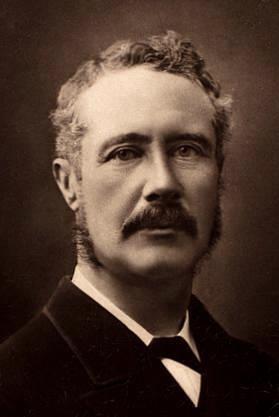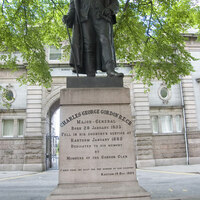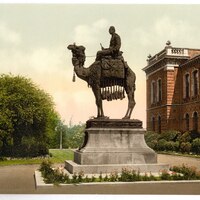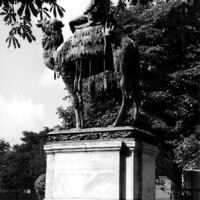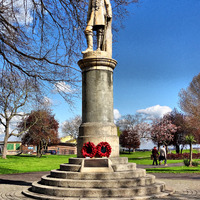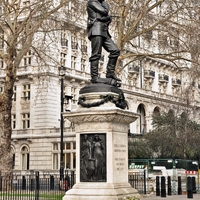How to cite this page Comment citer cette page
Gordon, Charles George
Person
- Media metadata | Métadonnées multimédias
- has biography | a une biographie
-
British army officer and colonial administrator. Gordon was Governor-General of the Sudan from 1877 to 1879 and 1884 to 1885.
Gordon's death in 1885 during the nationalist revolt in Sudan, led by the Sudanese religious and political leader Muhammad Ahmad, immortalised him as the archetypal colonial hero in Victorian society. George William Joy's famous painting, The Death of General Gordon (1893), presented Gordon as a stern martyr figure making his "last stand" against empire's racialised and infrahuman others. The cult of Gordon took several artistic forms, including bronze statues by Hamo Thornycroft and Edward Onslow Ford, and indeed outlasted the Victorians, as the films The Four Feathers (1939) and Khartoum (1966) exemplify. Lytton Strachey satirised the hero-worship around Gordon in his work Eminent Victorians (1918), sardonically describing the aftermath of the revolt with the words "At any rate, it had all ended very happily—in a glorious slaughter of 20,000 Arabs, a vast addition to the British Empire, and a step in the Peerage for Sir Evelyn Baring". - was born | est né
- 28 January 1833
- died in | est mort par
- 26 January 1885
- has nationality | a la nationalité
- United Kingdom of Great Britain and Ireland
- has type | est de type
- depicted
- is referred to by | est référencé par
- Wikipedia
- National Portrait Gallery
- Art UK - Charles George Gordon
- Art UK - George William Joy, The Death of General Gordon (1893)
- Project Gutenberg - Lytton Strachey, Eminent Victorians (1918)
- Alison Smith, David Blayney Brown, and Carol Jacobi, eds., Artist and Empire: Facing Britain's Imperial Past (London: Tate Publishing, 2015), p. 114, p. 141.
